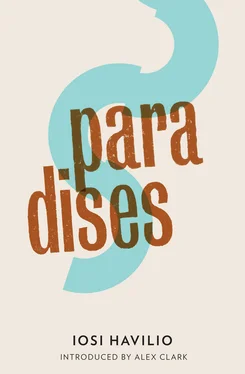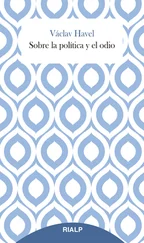Iosi Havilio - Paradises
Здесь есть возможность читать онлайн «Iosi Havilio - Paradises» весь текст электронной книги совершенно бесплатно (целиком полную версию без сокращений). В некоторых случаях можно слушать аудио, скачать через торрент в формате fb2 и присутствует краткое содержание. Год выпуска: 2013, Издательство: And Other Stories, Жанр: Современная проза, на английском языке. Описание произведения, (предисловие) а так же отзывы посетителей доступны на портале библиотеки ЛибКат.
- Название:Paradises
- Автор:
- Издательство:And Other Stories
- Жанр:
- Год:2013
- ISBN:нет данных
- Рейтинг книги:3 / 5. Голосов: 1
-
Избранное:Добавить в избранное
- Отзывы:
-
Ваша оценка:
- 60
- 1
- 2
- 3
- 4
- 5
Paradises: краткое содержание, описание и аннотация
Предлагаем к чтению аннотацию, описание, краткое содержание или предисловие (зависит от того, что написал сам автор книги «Paradises»). Если вы не нашли необходимую информацию о книге — напишите в комментариях, мы постараемся отыскать её.
is an almost perfect novel." — Albert Camus's
reimagined with a female lead in in twenty-first-century Buenos Aires.
Recently widowed, a young woman leaves the countryside for Buenos Aires with her four-year-old son where she seeks to build a new life for herself. She finds work in the zoo and moves into the human zoo of a squatted tower block at the invitation of one of its residents, to whom she acts as nurse, giving morphine injections.
Paradises — читать онлайн бесплатно полную книгу (весь текст) целиком
Ниже представлен текст книги, разбитый по страницам. Система сохранения места последней прочитанной страницы, позволяет с удобством читать онлайн бесплатно книгу «Paradises», без необходимости каждый раз заново искать на чём Вы остановились. Поставьте закладку, и сможете в любой момент перейти на страницу, на которой закончили чтение.
Интервал:
Закладка:
Axel tells us without anyone asking that his psychiatrist, he calls her the girl, stood him up. She isn’t answering her mobile, or her landline, she doesn’t seem to be anywhere, she’s been kidnapped as far as I can make out. Eloísa forgets about the jewels, she hides it well, and goes out to the garden: Be right back. Have you eaten, Axel asks me. I make a gesture he understands as a no and he brings a bag of crisps, a tin of palm hearts, cheese slices and Coca-Cola from the kitchen. They leave me alone in the middle of the house and I would flee like before but I’m scared of getting trapped again. Eloísa returns with her hands busy rolling a joint. She winks at me behind Axel’s back, inviting me to stay calm, as she moves her lips to say: All fine. We smoke, we eat, we make ludicrous conjectures about the whereabouts of the psychiatrist. We laugh like good friends. Axel becomes animated and unfolds the giant screen to watch television. A flick through the channels and we get caught on a video clip: a guy in a motorbike helmet next to a cardboard tree. Magically, another guy appears at his side, a kind of hippy with a Creole guitar and his hair in his face. Between them, a desperate-looking girl. They sing: There’s someone living inside of me as if I were his house. The chorus is catchy, Eloísa joins the choir, Axel la-la-las, I’m shuddering. I think about Tosca, about her tumour, the spud, which lives inside her as if she were its house. At the end of the song, the boy in the helmet is alone once more, steaming up the visor with his breath.
I’m off, I say at one point, assuming that it’s getting late. Axel makes a joke I don’t hear, at which he laughs alone. Eloísa walks me to the bus stop. Crossing the avenue, she pulls my arm: It’s all good, he didn’t realise anything was up. He totally bought the thing about me showing you the house. I don’t reply, in fact I don’t give her the pleasure of making eye contact as she wants to. Eloísa gets annoyed, my silence bothers her. We’ll do it next Friday, she says and becomes bold: It can’t happen twice in a row. We’re immune. That’s what she says: immune.
Under the bridge, without stopping, I tell her no. Best not. Why not? She squeezes my wrist hard. She repeats indignantly: Why not? Eloísa forces me to stop and I’m standing between her and a bed of curved bricks separating the pavement from the embankment. I try to think and I end up saying something that only makes it worse: Why don’t you do it yourself? Eloísa becomes furious, she speaks with a fresh hatred. You’re a shit, she’ll spit out at least four times before she finally leaves. I cross the street. Before disappearing into the tunnel she shouts again with all her anger, her hands cupped around her mouth to produce a megaphone: Baaack-staaaaabber.
The heat pushes us out to the street during the night. Everything sticks to us, mattress, clothes, hair. Simón tosses and turns in bed emitting thin little whimpers, mouth closed, like a subjugated animal. I observe him from the corridor with the door open to see if the air is moving out there, until he sits up and looks straight at me with the face of a bad-tempered adult announcing that he won’t stand it any longer. He gives up trying to sleep. At the entrance to the building there’s a group who, like us, can’t tolerate enclosure and have come out in search of unlikely relief. There’s Perico, el Buti’s brother, crouching under a tree; nearer us, more visible, a couple of teenagers drinking beer and a fat family with their radio blasting. Benito and Tosca aren’t there; I wonder how they’ll manage to bear the heat in that chaotic apartment with such low ceilings. I can see Canetti with his limping gait, coming and going, his head bowed as if he has lost something. Luckily, he doesn’t notice me. We move away, streets, passageways, the train tracks. We reach a paved plaza where an indigenous camp is set up under the motorway and we turn back. I can’t get it out of my head: There’s someone living inside of me as if I were his house.
Thirty-one
Leaning against the trunk of the paradise near us, where we buried the iguana, there’s a broken mirror. In pieces. The part that’s still intact is shaped like a shark fin. Or a wave, wide at the base, pointed at the crest. I observe it for a moment, I measure it up without touching, I crouch down and my reflection turns into another me, berserk and fragmented, asking for shelter. I make a decision. I climb the stairs with the mirror under my arm. Transporting it is uncomfortable and somewhat dangerous. I don’t always remember to stretch my neck to avoid pricking myself. I think that if I trip, my natural impulse would be to block the fall with my hands and so the sharp edge would embed itself in my jugular or if I was lucky slice off an ear. A stupid death, a bit like Jaime’s, but even more so, because of the manner of it and the spectacular nature of the bleeding. I think about Simón telling the story twenty years from now. Tragicomic.
It must be two, three in the morning. I have no way of finding out. My mobile says 17.33, I’ve never known how to set the time. I pace round the room with a new, unfamiliar restlessness I can’t identify. I walk in circles, figures of eight. My gaze drops and the sight of my hairy legs reminds of the pink razor I bought at the kiosk a week ago. I spend a while looking for it until I discover it under the wardrobe, intact, unused, still in its clear plastic wrapping. On the label there’s a fantasy aeroplane flying over a beach with flowers and palm trees. Travel to the Bahamas with your best friend, it says. To take part in the competition you have to cut out as many of the brand’s logos as you can, amass points, send them in the post and wait for the draw at the end of the summer. I wonder what the deal is with the best friend, whether it’s a manner of speaking, or whether whoever wins has to demonstrate in some way that this is her best friend and not just anyone. In my case, I’d have to choose between Iris and Eloísa, the problem is who would keep an eye on Simón. Tosca, Sonia, yes, more likely, we’d have to see what Mercedes said. I could also check whether in special cases they would allow a son instead of a best friend.
Sitting on the toilet, I soap my legs with cold water ready to shave them for the first time in quite a while. At least since Jaime’s death. Partly because the hair has been growing with less vigour recently and doesn’t annoy me. I do it carefully, taking my time. When I finish, I debate whether or not to shave my pubic hair. I move on to my armpits. I examine them in the mirror and I have to contort myself to see properly, accommodating my body to fit this capricious, quiet wave shape. Done. Clean, I feel strange, lighter, unprotected. On my knees, I now notice above my ears two clusters of white hairs sticking out in curls. Nowhere else on my head, just there. The novelty is not so much the white hairs but the quantity. I’ve found the odd white one before, here and there, lost, premature, without company, as if in a panic about the passage of time. But this is different, it’s not one or two or five, more like a dozen on each side. I spend a while combing them with my fingers and suddenly, because some part of me must be resisting, but above all because I have the urge to do some pruning, I decide to cut my hair. The scissors Herbert left here a couple of days earlier are to hand. He brought them to cut dinosaurs out of a magazine he found on the street. I begin rather timidly, with the mirror behind my neck, a rear-view mirror, layering the ends at the back. I continue with the sides, where the white hairs are, and the fringe. I cut prudently, I try to chop the same amount each time. Until without meaning to, lack of concentration or rage, the scissors slip from my hand and pull out a clump almost from the root. The incident paralyses me, I contemplate the bare patch, unable to decide whether it could go unnoticed. Something inside me starts to ponder a decision that initially seems like madness and gradually becomes the solution. An idea that my hand takes it upon itself to make irreversible with three violent snips. In less than five minutes my head is covered by a fine pelt of hair that must be no longer than three centimetres. The problem is that I’m limited by my joints, as well as the curves of the mirror, which prevent me from having a full view, condemning the cut to irregularity. I’m about to wield the razor and bring the matter to a close by shaving myself entirely, but a certain vision of the future stops me. Shaved, it strikes me that I would stop being me to a certain extent, would become a caricature of myself. And that must be the frightening part, being more me than I already am. In any case, I restrain the impulse in time and a few hours later, mid morning, Herbert will take care of evening out my new hairdo. In front of the mirror, I realise that he handles the scissors like a pro, much better than me. Simón says nothing, I think he likes it.
Читать дальшеИнтервал:
Закладка:
Похожие книги на «Paradises»
Представляем Вашему вниманию похожие книги на «Paradises» списком для выбора. Мы отобрали схожую по названию и смыслу литературу в надежде предоставить читателям больше вариантов отыскать новые, интересные, ещё непрочитанные произведения.
Обсуждение, отзывы о книге «Paradises» и просто собственные мнения читателей. Оставьте ваши комментарии, напишите, что Вы думаете о произведении, его смысле или главных героях. Укажите что конкретно понравилось, а что нет, и почему Вы так считаете.











